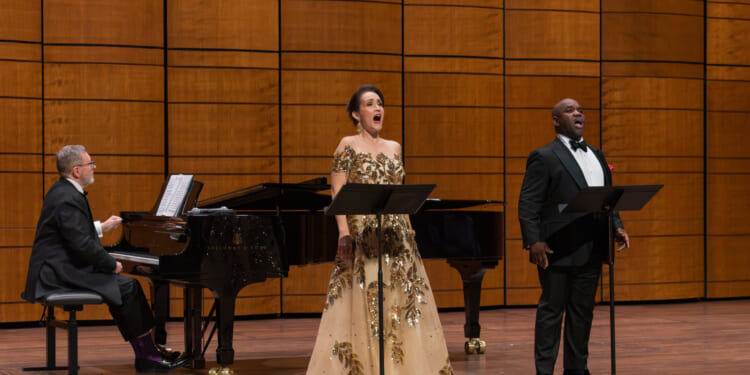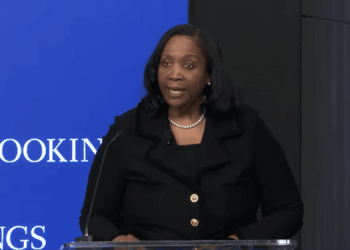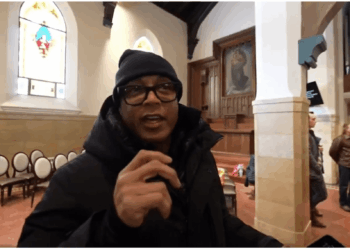“Just imagine having such huge stars here in D.C.!” gushed an audience member ascending the elevator to the rooftop Terrace Theater of the John F. Kennedy Center for the Performing Arts to attend this season’s opening recital of Vocal Arts DC (formerly the Vocal Arts Society).
The “huge stars” in question were the soprano Erin Morley and the tenor Lawrence Brownlee, ably accompanied by the Scottish pianist Gerald Martin Moore. Both singers are at the peak of their careers and are starring together this fall in the Metropolitan Opera’s revival of Donizetti’s sparkling comedy La fille du régiment. Brownlee has also served as a luxury substitute for the tenor in multiple performances of the Met’s new production of Bellini’s La sonnambula. He and Morley are, as we were endlessly told over the course of the afternoon, featured on a newly released album titled Golden Age. Much of the recital’s selection of French and Italian operatic set pieces overlapped with the album.
Most opera fans associate the term “golden age” with the unusually high concentration of superb performances given by legendary singers—some of them still in the popular consciousness today—in the two decades or so after World War II. For all the hype around Vocal Arts’s recital program, the discerning listener reluctant to throw around the phrase willy-nilly was vindicated by what ensued.
No hint of a golden age was detectable in this underwhelming afternoon. Morley’s voice is attractive and has served well in many roles, but in the most challenging selections of the program—drawn from bel canto works meant to be its highlights—the soprano succumbed to weak leadups and sharp high notes. Brownlee, who in the lyric-tenor bel canto repertoire has long ranked second to the more adept Juan Diego Flórez, tends to come in under his high notes with an unfortunate bleat he has never quite lost.
The personal chemistry of the duet was never in doubt, but the voices seemed to play to each other’s weaknesses. “Ah! quel respect, Madame,” from Rossini’s Le comte Ory, in which the tenor lead pursues his love into a convent while disguised as a nun, started out suitably coy but ended with a nasal high B from Brownlee and a rather shrill attempt at a high D from Morley. “Quoi, vous m’aimez?” from La fille du régiment had the same effect: a gentle leadup but high notes that never quite landed. Their encore duet, “Tornami a dir che m’ami,” from the same composer’s Don Pasquale, was just as unconvincing.
The bel canto solo selections weren’t much better. Morley delivered “Caro nome,” Gilda’s aria of infatuation from Verdi’s Rigoletto, with initial grace, but the coloratura runs again ran into upper range trouble. It left the impression that the role simply is not for her. Brownlee’s “Nel furor delle tempeste,” from Bellini’s Il pirata, again suffered from a pinched quality that obscured full exhibition.
Their bel canto missteps aside, the singers did rather better in the rich Romantic selections drawn from French works of the late nineteenth century, by which time deeper and more emotive singing had displaced the expository bel canto school. The duet “C’est le dieu de la jeunesse” from Delibes’ Lakmé, in which a colonial British officer falls for a Hindu priestess, was the afternoon’s highlight, with both singers availing themselves of their warm and solid middle registers, as the priestess’s emotions evolve from outraged repulsion to irresistible attraction. Morley started out well in her solo aria “Où va la jeune Hindoue?” (the famous “Bell Song” from Lakmé), which she performed with the Washington Concert Opera in 2022, even if the coloratura runs did not quite succeed in this performance.
She and Brownlee repeated their earlier success at the beginning of the recital’s second half, which opened with “Ils verront si je mens!” from Bizet’s rarely performed La jolie fille de Perth, a Walter Scott adaptation that Moore, the Scottish accompanist, said he loves for its setting in his home country. The pianist proceeded to receive well-deserved applause for a solid playing of a piano transcription of the overture to Ambroise Thomas’s Mignon. That was, unfortunately, his only solo performance in this confused recital.

















